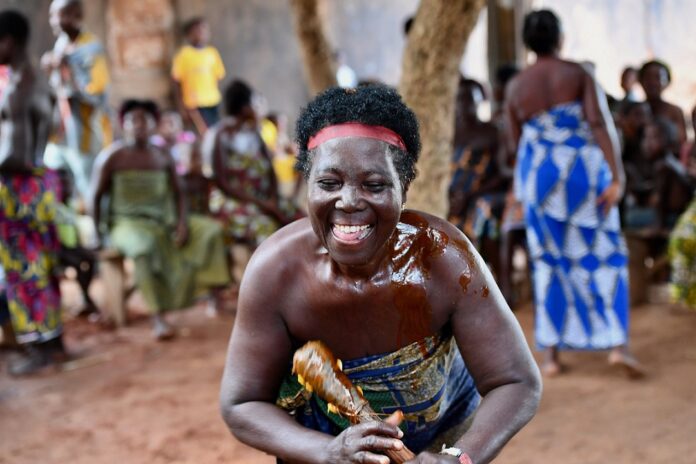The Mis-Educated Than His Ancestors, the METHA, fears the past. With this fear, which he wields, he also fears the present. It is as if he wishes to run away from the past, evade the present and somehow—and this is what he hopes—to land somewhere between Heaven and his own dreams. At least this is the Metha’s fantasy.
The Metha’s fear evokes his weird feelings about the past and the present. If you don’t believe me, take a very good look at the Metha when he visits his parent’s old village—where his mother was actually born, bred, raised, cultured and given what he now admires about a woman. Put another way, imagine the Metha in her old village, where her father was born, bred, trained, and disciplined to become what she now admires about a man.
In this village, if and when the Metha advances towards a Legba, the Vodun statue, of his clan home or his Ancestral Home—which stands at the center of the compound—he trembles. He fears the Legba. He fears the past where his ancestors reside, if even only spiritually. He also fears the Legba because he fears the present. He fears the present because he is frightened about his connection to this past. A past that is, clearly, greater than he.
It is the Metha’s inferiority, which he feels in connection to the past; which he feels when he considers the memories of the Ancestors, who were greater than he; which he fears the most. Within the Metha’s artificial intelligence, impressed upon him by some mediocre mis-educators in some mediocre missionary colonial schools situated far away in some bushes, the Metha knows that his own might pales in comparison to the achievements of his own Ancestors. Part of the Metha’s fear of his own past and the present is this inferiority he feels, yet he disregards it, or even he attempts to overcome this fear by feigning bravery.
The Metha may read this essay and he will actually oppose this diagnosis of his trauma—his trembling in the face of the Gods. He might even say that he only feels discomfort because he is Christian or Muslim or another. It is none of these things. I assure you. In fact, it is the Legba’s physical presence that dis-orients him: The seeming lack of roundness of form, of limbs, the lack of a Euclidean approximation to “correctness” of form and “justness,” all of which dross he has been spoon-fed in those mediocre colonial missionary schools, is what makes the Metha feel additionally discombobulated!
The Vodun statue at the center of the compound disorients the Metha’s bearings, as it should. His trauma is heightened and his sense of the past and the present awakened and juxtaposed against his inferior existence. This is his fear. You see?
At the same time, and this is what makes his fear all the more debilitating for his own sake, the Metha can at moments recall the brilliance of his immediate forefathers and foremothers. He can! He recounts in silence his dim knowledge of the religious beliefs of his Ancestors, which is clothed in subtle intellectual forms, lofty and clean, without the fleshly grossness of his materialism; and with this acknowledgment the Metha draws on his paramount fear, which permeates his inquisition about what may in God’s name connect that intellectual Ancestral system somehow with that “crude image” of the Legba—that “inadequate idol”—how, he exclaims to himself, does this all make any sense?
The Legba and the intellectual system of the Ancestors do not “properly belong together” in the Metha’s own mind. How can the Legba become a conduit to the Gods through such specific accessions and steady augmentation to holiness which the Legba acquired through a series of libations, incantations, reincarnations and promotions extending over centuries? How can the Legba now vicariously receive worship and transmit messages to the Ancestors and the Gods?
The Metha’s discombobulation is soothed only through fear and escapism. And so the Metha fears his own past, and he fears his own present. He wishes to evade the past, sidestep the present and catapult himself into his own fantasies. The Metha’s fear of himself may not even be skin-deep, but it infests his blood; it infests his mind; and it taints his soul. The Metha is disturbed.











Bring the Legbas back to Accra!